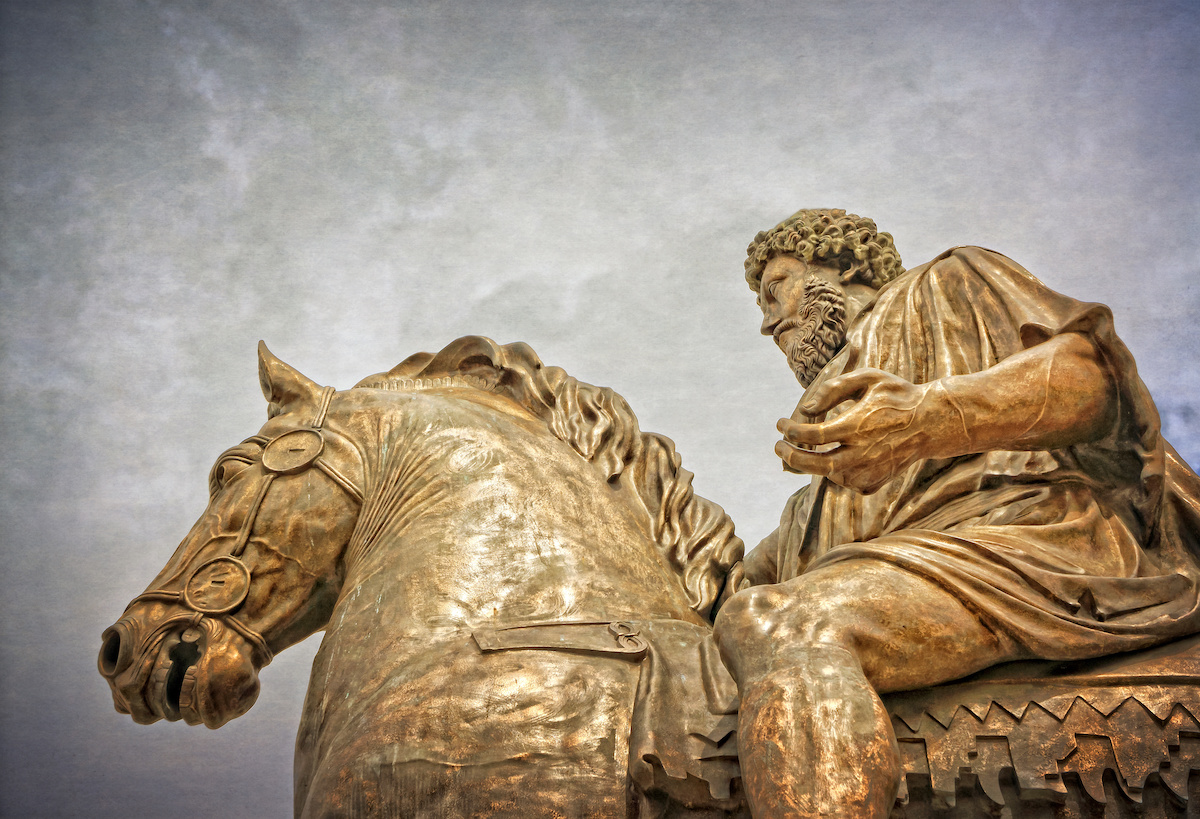Modern Stoicism: From Christians to atheists, everyone can learn from these ancient Greeks

- At first glance, there appears to be little in common between Stoicism and many major world religions, particularly Christianity.
- However, the Stoics elaborated timeless truths, and their psychological insights form the basis of modern-day cognitive therapy.
- Especially on the topics of ingratitude, anger, and worry, the Stoics have much to teach the world.
Why, what else can I, a lame old man, do but sing hymns to God? If, indeed, I were a nightingale, I should sing as a nightingale, if a swan, as a swan. But as it is, I am a rational being, therefore, I must be singing hymns of praise to God. This is my task; I do it, and will not desert this post, as long as it may be given to me to fill it; and I exhort you to join me in this same song. — Epictetus, Discourses I. 16
The first thing which philosophy undertakes to give is fellow-feeling with all men; in other words, sympathy and sociability. — Seneca, Epistle 5
Ancient Stoic wisdom of the first and second centuries from the likes of Musonius Rufus, Lucius Anneaus Seneca, Epictetus, and Marcus Aurelius has taken the modern world by storm. Writing as a psychologist, I cannot help but note cognitive behavioral psychotherapies, the predominant methods of our time, are based upon fundamental insights from the Stoics. Epictetus wrote in the fifth chapter of his little Handbook that “people are not disturbed by things, but by the views they take of things.” Psychologist Albert Ellis, founder of rational emotive behavior therapy, and psychiatrist Aaron Beck, founder of cognitive therapy, explicitly agreed and credited Epictetus for this fundamental insight into how purposefully changing our thinking can change our emotions and behaviors, too.
The Stoics so overflow in both psychological and ethical insights that a modern re-emergence in interest in the practice of Stoicism has throughout the world. Especially intriguing is that modern-day students of the Stoics come from virtually all the world’s major religions — Buddhists, Hindus, Muslims, and Christians as well as a vast number of agnostics, atheists, and secular-minded men and women. Clearly, there is something within Stoic wisdom that can potentially resonate with any human being and perhaps help draw us closer together in our shared humanity (just like Seneca promised).
Christian Stoicism
My focus here, as a Roman Catholic and a Thomist (student of the philosophy and theology of St. Thomas Aquinas) is to highlight a few important Christian responses to Stoicism across the ages, since I believe Stoic insights and practices can make us better Christians. After all, it is hard to follow Jesus’s great commandments to love God with all that we are and our neighbors as ourselves, if we are overwhelmed by anxiety, sadness, anger, envy, greed, lust, or a whole host of worldly distractions.
I’m not saying the Stoics were Christians, mind you. Most lived before Christ, and none provided any detailed knowledge of early Christianity in their writings. Most seemed to tend toward a kind of pantheism equating God with nature or the Universe, though some, like Epictetus and Seneca, do seem to point to a personal God, sounding much like Christians, if we didn’t know better!
No, the second century Christian apologist, St. Justin Martyr, in his Second Apology, chapter 8, hit the nail on the head when he wrote as follows: “And those of the Stoic school — since so far as their moral teaching went, they were admirable…” He then went on to praise the character of Musonius Rufus, Epictetus’s teacher, for living a “reasonable and earnest life,” shunning vice. While early Christian theologians disagreed with the Stoic understanding of God, it is Stoic “moral teaching” that they found quite “admirable.”
The Stoics were focused on the inherent dignity and value of every person and of living lives of virtue, based on the fact the we are rational and social beings. Some, like Rufus, said this derived from the fact that we were made in God’s image. The Stoics taught that a life seeking virtue and not simply pleasure is what leads to inner peace and true happiness or fulfillment, what the Stoic founder Zeno of Citium called a “good flow of life.” Some called this living according to nature. Some called this living according to God’s will.
Epictetus wrote nothing himself that we are aware of, but thanks to his devoted student, the historian Arrian, we have four books of Epictetus’ fascinating Discourses culled from live lectures and the Handbook, a condensation of writings from the longer Discourses. The Handbook, a word-dense work of 53 brief chapters (some just a line or paragraph) constituting but a couple dozen pages in a modern book, was so well-received among the early and medieval Christians that at least three “Christianized” adaptations were produced between the 5th and 16th centuries as moral guidebooks for monks. Quite intriguingly, the Handbook was altered and tailor-made for Christian audiences, not only by citing similar messages from Scripture, but even by substituting the names of saints for the names of philosophers, like St. Paul in place of Socrates!
Perhaps more importantly, medieval Catholic scholars with a great respect for human reason as well as faith, carefully mined (without altering) original Stoic lessons for leading virtuous lives. Most prominent among them was St. Thomas Aquinas of the 13th century. While he is known primarily as a follower and adapter of Aristotle in his philosophy, Thomas openly borrowed extensively from the Latin-writing Stoic Seneca in his masterwork, the 1.8-million-word Summa Theologiae. (Thomas was not fluent in Greek, the language of Rufus, Epictetus, and Aurelius.)
In the second of three parts of that great work, he addresses issues including human nature, virtues, and happiness, and he quotes and reflects on the insights of Seneca again and again, including his analysis of the nature of human anger (and the sin of wrath, or inappropriate anger), of the virtue of clemency in dealing out punishment, and of the virtue of gratitude, which Thomas saw as essential to exercising the virtue of justice.
Indeed, in his treatment of anger, Thomas even attempts to reconcile apparent differences between the thoughtful approaches of Aristotle and Seneca. Aristotle said anger could be appropriate in the right measure, at the right time, at the right person, for the right reason, while Seneca and the Stoics viewed all anger as passion contrary to reason. Thomas, however, argues “this difference, although it appears great in words, is nevertheless in reality, none at all, or but little, if we consider the intent of either school,” (Summa Theologiae, I-II, Q. 24, a. 2) believing the difference to lie mostly in psychological terminology, and little to none in practice.
In his treatment of the virtue of gratitude and how it is to be lived out in our lives, Thomas shows his gratitude to Seneca for his book On Benefits, by citing him more than any other philosopher or Church Doctor. To give but a taste, on the sinfulness of ingratitude: “Seneca declares (On Benefits, ch. 3) that ‘to forget a kindness is the height of ingratitude.’” Thomas clarifies Seneca’s intention to refer not to an unwilling failing of human memory, but to forgetfulness that comes with negligence: “For, as Seneca observes (On Benefits, ch. 3) ‘when forgetfulness of favors lays hold of a man, he has apparently given little thought to their repayment’” (ST, II-II, Q. 107, a. 1).
Perhaps the most surprising appearance of Stoic wisdom in Catholic theology is when St. Thomas considers the Catholic theory (not a defined dogma) of limbo, conceptualized to be a place neither heaven nor hell, in which innocent unbaptized people might spend eternity, lacking God’s grace but without personal sin. Thomas cites Seneca who wrote that a wise person is not disturbed by things he cannot control. Thomas expounds that one guided by reason does not grieve over things he has no power to control, but only over things within his power: “Thus no wise man grieves for being unable to fly like a bird, or for that He is not a king or emperor, since these things are not due to him.” Thomas proceeds to explain that the souls of unbaptized children will not grieve for their lack of divine vision, but they will “rejoice for that they will have a large share of God’s goodness and their own natural perfections” (ST, Supplement, appendix 1, article 2).
Modern stoicism for all
So, Stoic wisdom shows up in the most surprising places, from the texts of modern psychotherapy manuals to medieval manuals of Catholic theology — and for all the right reasons. A Christian reader may find a dip into the works of Rufus, Epictetus, Seneca, or Aurelius can help one become a better follower of Christ. Any reader may find a dip into the stream of Stoic wisdom most refreshing, fostering a good flow of life, and helping one become a better person.





